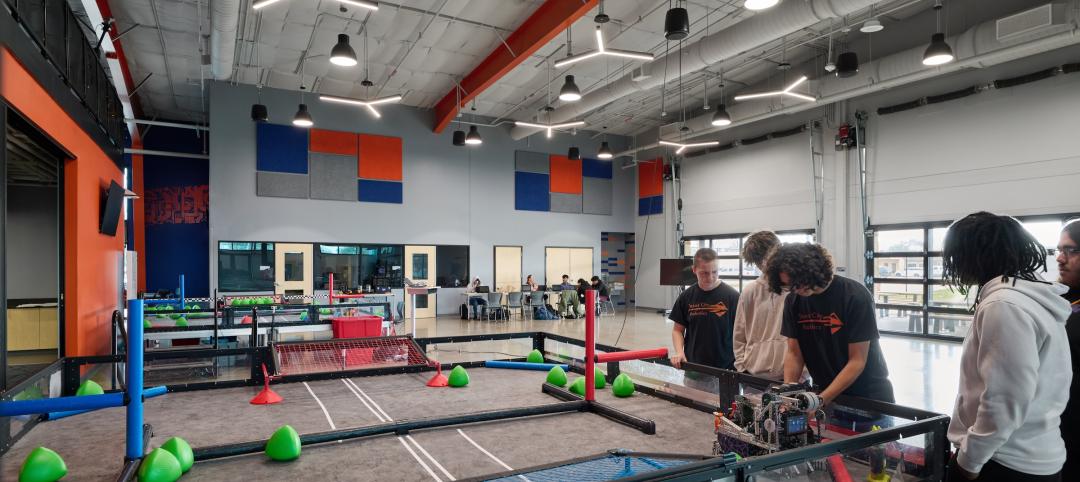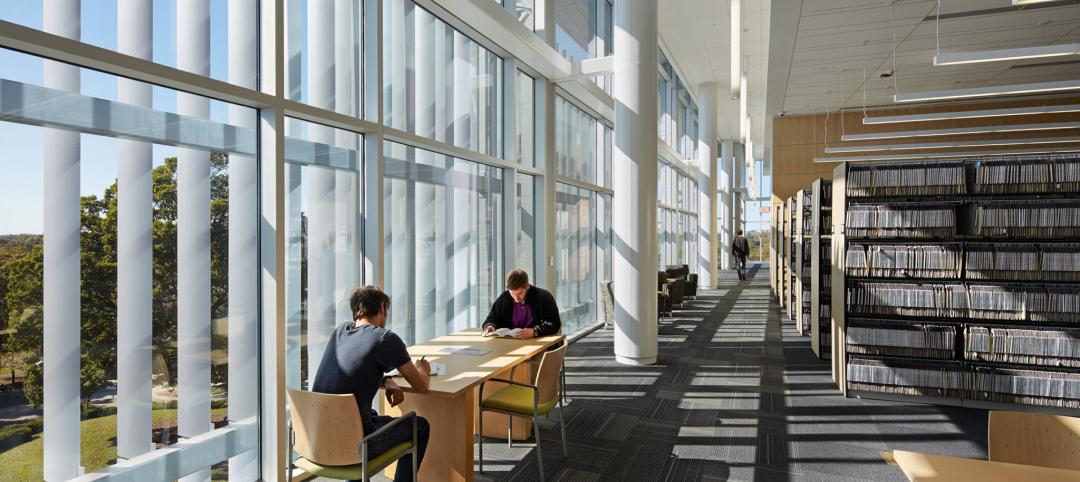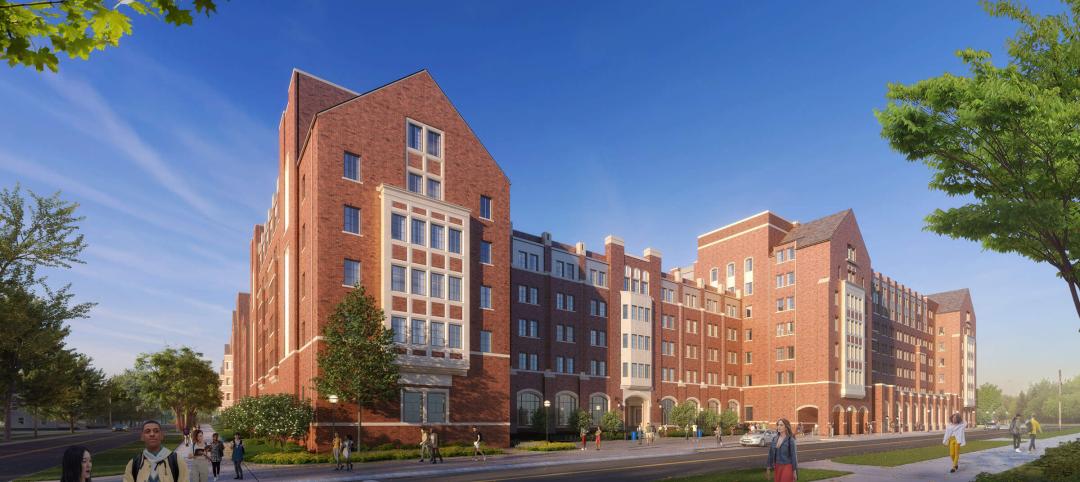| The intra-operative MRI system at the United Hospital Nasseff Neuroscience Center in St. Paul, Minn., will allow neurosurgeons to perform real-time MRI scans during operations to confirm that all cancerous tissue is removed during procedures. |
11. Operating Room-Integrated MRI will Help Neurosurgeons Get it Right the First Time
A major limitation of traditional brain cancer surgery is the lack of scanning capability in the operating room. Neurosurgeons do their best to visually identify and remove the cancerous tissue, but only an MRI scan will confirm if the operation was a complete success or not. Consequently, patients must be stitched up and wheeled into the MRI room for further scans. If cancer is still present, further surgery is often required.
To avoid putting its patients through this painful cycle of surgeries and scans, the United Hospital Nasseff Neuroscience Center in St. Paul, Minn., is collaborating with HDR Architecture on an intra-operative MRI system. This "MRI on a track" will be able to move between two operating rooms and spin in any direction, allowing neurosurgeons to perform real-time MRI scans during operations.
"The neurosurgeon can use the intra-operative MRI to confirm that the entire tumor was removed before closing, thus reducing the need for additional operations," says Douglas S. Wignall, AIA, RAIC, international healthcare director with HDR Architecture, Omaha, Neb. In addition, Wignall says the mobility of the system allows the neurosurgeon to update images quickly and efficiently so that surgical adjustments and decisions can be made with pinpoint accuracy.
"This is one example of how architecture can help save lives," says Wignall.
| The new SYNC modular nursing station line from Nurture by Steelcase is designed to accommodate both centralized and decentralized spaces. |
12. Nursing Stations Go Modular
Modular nursing stations are designed to accommodate virtually any healthcare environment, whether for centralized or decentralized spaces, standard or high-tech facilities, or new or retrofit projects. HDR Architecture collaborated with Nurture by Steelcase on the SYNC line, which was inspired by the way people fit in cockpits and automobiles. It accommodates multiple users, heights, and movements.
The centralized solution is offered in three fixed heights—28½, 36, and 42 inches—to provide seated, service counter, and standing solutions. Widths are available in one-foot increments from five to nine feet, and integrated monitor arms have 160-degree adjustability for sharing information between caregivers. The product sits elevated off the floor, creating a light, minimalistic look.
The decentralized products provide height-adjustable (23 to 48 inches), fixed, or combination surfaces in eight shapes. Two-person configurations allow each work surfa
ce to be adjusted individually.
| A. Secondary MOB. B. MOB. C. Hospital. D. Nursing units. E. Signature entry rotunda. F. Future construction, including hospital expansion, additional MOB, clinic, and parking. G. Future helipad. |
13. Template Helps Hospitals Open Quickly and Efficiently
Faced with the unprecedented task of having to replace half its California hospital beds by 2015, Oakland, Calif.-based Kaiser Permanente, the nation's largest nonprofit HMO, enlisted SmithGroup and Chong Partners Architecture (now Stantec Architecture) to collaborate on the design of a new hospital template—a state-of-the-art, prototypical hospital that could be built on many different sites with only minimal changes to the basic concept for quick and efficient construction.
Luckily, the team wasn't starting from scratch. Over the years Kaiser had developed best-practices templates for emergency departments, patient rooms, and other individual clinical spaces and those pieces were combined into a single configuration for an entire hospital. The resulting template consists of common planning concepts, floor plans, equipment and furnishings, and structural and building systems. Exterior skins and colors vary from site to site. So far Kaiser has built five hospitals using the template, which shaved 15 to 18 months off its typical new hospital timeline.
Related Stories
K-12 Schools | Aug 8, 2024
New K-12 STEM center hosts robotics learning, competitions in Houston suburb
A new K-12 STEM Center in a Houston suburb is the venue for robotics learning and competitions along with education about other STEM subjects. An unused storage building was transformed into a lively space for students to immerse themselves in STEM subjects. Located in Texas City, the ISD Marathon STEM and Robotics Center is the first of its kind in the district.
Affordable Housing | Aug 7, 2024
The future of affordable housing may be modular, AI-driven, and made of mushrooms
Demolished in 1989, The Phoenix Ironworks Steel Factory left a five-acre hole in West Oakland, Calif. After sitting vacant for nearly three decades, the site will soon become utilized again in the form of 316 affordable housing units.
Architects | Aug 5, 2024
Mastering the art of project schedule: Expert insights on design and construction
We sat down with two experts in the design field, Ron Dick (Founding Partner and Architect) and Mike Niezer (COO and Architect), to talk about everything you need to know about the entire process.
University Buildings | Aug 1, 2024
UC Riverside’s student health center provides an environment on par with major medical centers
The University of California, Riverside's new Student Health and Counseling Center (SHCC) provides a holistic approach to wellness for students throughout the UC Riverside campus. Designed by HGA and delivered through a design-build partnership with Turner Construction Company, SHCC provides healthcare offerings in an environment on par with major medical centers.
Libraries | Aug 1, 2024
How current and future trends are shaping the libraries of tomorrow
Over the last few years, public libraries have transitioned from being buildings that only store and lend books to being fully featured community centers.
MFPRO+ News | Aug 1, 2024
Canada tries massive incentive program to spur new multifamily housing construction
Canada has taken the unprecedented step of offering billions in infrastructure funds to communities in return for eliminating single-family housing zoning.
Government Buildings | Aug 1, 2024
One of the country’s first all-electric fire stations will use no outside energy sources
Charlotte, N.C.’s new Fire Station #30 will be one of the country’s first all-electric fire stations, using no outside energy sources other than diesel fuel for one or two of the fire trucks. Multiple energy sources will power the station, including solar roof panels and geothermal wells. The two-story building features three truck bays, two fire poles, dispatch area, contamination room, and gear storage.
Contractors | Aug 1, 2024
Nonresidential construction spending decreased 0.2% in June
National nonresidential construction spending declined 0.2% in June, according to an Associated Builders and Contractors analysis of data published today by the U.S. Census Bureau. On a seasonally adjusted annualized basis, nonresidential spending totaled $1.21 trillion. Nonresidential construction has expanded 5.3% from a year ago.
Student Housing | Jul 31, 2024
The University of Michigan addresses a decades-long student housing shortage with a new housing-dining facility
The University of Michigan has faced a decades-long shortage of on-campus student housing. In a couple of years, the situation should significantly improve with the addition of a new residential community on Central Campus in Ann Arbor, Mich. The University of Michigan has engaged American Campus Communities in a public-private partnership to lead the development of the environmentally sustainable living-learning student community.
MFPRO+ New Projects | Jul 31, 2024
Shipping containers converted into attractive, affordable multifamily housing in L.A.
In the Watts neighborhood in Los Angeles, a new affordable multifamily housing project using shipping containers resulted in 24 micro-units for formerly unhoused residents. The containers were acquired from a nearby port and converted into housing units at a factory.



















